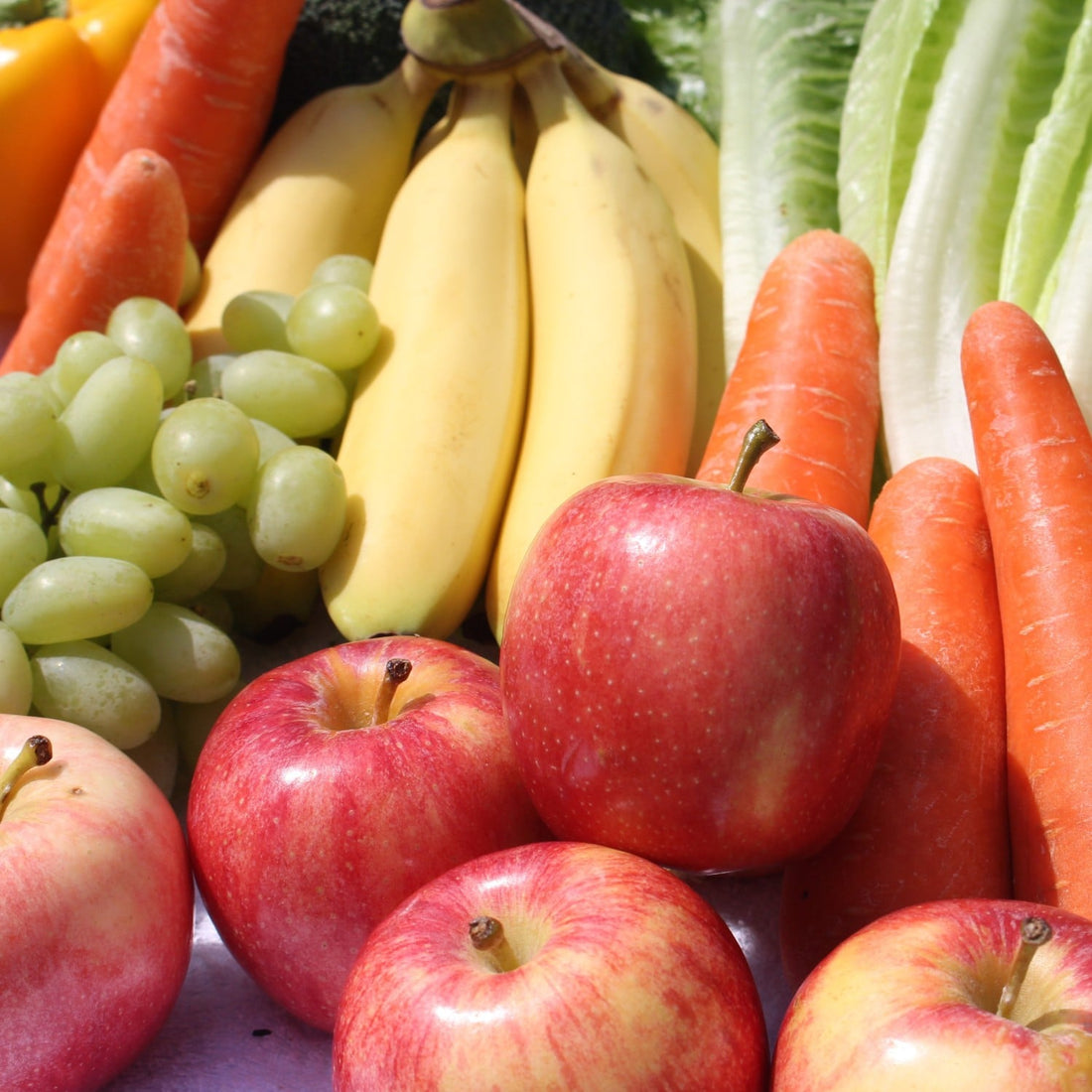Consuming a variety of fruits and vegetables plays a crucial role in promoting overall health and well-being. Fruits and vegetables are rich in essential vitamins and minerals, making them a valuable addition to any diet. Not only do these nutrient-dense foods provide a wide array of health benefits, but they also offer various flavors and textures, making meals more enjoyable and satisfying.
Fruits and vegetables offer a multitude of health benefits, owing to the presence of essential vitamins and minerals. These natural wonders are packed with vital nutrients, which play a crucial role in maintaining overall well-being.
Fruits and vegetables are essential components of a healthy diet, providing a wide array of essential nutrients that are crucial for maintaining optimal health and well-being. These natural foods are rich sources of various vitamins and minerals, as well as dietary fiber, all of which play key roles in promoting overall health.
Fruits and vegetables contain a complex network of vitamins, minerals, and dietary fiber, all working in synergy to promote vitality.
In this article, we will explore the numerous nutritional benefits of fruits and vegetables and their significant contribution to preventing various diseases.
What Does Fruit and Vegetables Do for Your Body?
Fruits and vegetables contain a variety of vitamins and minerals that are essential for the body's proper functioning. Vitamin C, found in citrus fruits, and dietary fiber, present in most fruits and vegetables, contribute to improved digestion and help prevent constipation. Additionally, green leafy vegetables like spinach and kale are abundant in folate, a B vitamin crucial for a healthy diet.
Fruit and vegetables play an indispensable role in our health as they hold a broad spectrum of vital nutrients. Acting beyond just fulfilling the dietary requirements, the intake of fruits and vegetables can help reduce the risk of chronic diseases such as type 2 diabetes and heart disease.
Fruits and vegetables are essential components of a healthy diet, providing a wide range of nutrients and benefits that contribute to overall well-being.
Here are some of the key ways in which fruits and vegetables benefit the body:
- Rich in Vitamins and Minerals - Fruits and vegetables are excellent sources of essential vitamins and minerals such as vitamin C, vitamin A, potassium, folate, and various B vitamins. These nutrients are crucial for supporting various physiological functions, including immune function, vision, and energy metabolism.
- High in Dietary Fiber - Fruits and vegetables are rich in dietary fiber, which is important for digestive health. Fiber helps prevent constipation, promotes regular bowel movements, and contributes to a feeling of fullness, which can aid in weight management.
- Antioxidant Properties - Many fruits and vegetables contain antioxidants, such as flavonoids, carotenoids, and vitamin C, which help protect cells from oxidative stress. Antioxidants play a role in reducing the risk of chronic diseases and supporting overall cellular health.
- Hydration - Fruits and vegetables have high water content, contributing to hydration. Staying well-hydrated is important for various bodily functions, including temperature regulation, joint lubrication, and nutrient transport.
- Disease Prevention - Regular consumption of fruits and vegetables is associated with a lower risk of chronic diseases such as heart disease, certain cancers, and age-related eye conditions. The combination of various nutrients and bioactive compounds in these foods contributes to their protective effects.
- Weight Management - Fruits and vegetables are generally low in calories and high in nutrients, making them valuable for weight management. Their high fiber content also helps control appetite and reduce overall calorie intake.
- Support for Immune Function - Nutrients like vitamin C, vitamin A, and folate found in fruits and vegetables play a role in supporting a healthy immune system. These nutrients contribute to the production and function of immune cells.
- Bone Health - Some vegetables, such as leafy greens, are good sources of calcium and vitamin K, which are important for maintaining strong and healthy bones.
- Reduced Risk of Cardiovascular Disease - Diets rich in fruits and vegetables are associated with a lower risk of cardiovascular diseases. The fiber, antioxidants, and potassium in these foods contribute to heart health by supporting blood pressure regulation and reducing inflammation.
- Improved Skin Health - Vitamins A and C, found in many fruits and vegetables, are essential for maintaining healthy skin. These vitamins play roles in collagen production, skin repair, and protection against oxidative damage.
It's important to consume a diverse array of fruits and vegetables to ensure a broad range of nutrients. Including a variety of colors and types in your diet can help maximize the potential health benefits. Aim to fill half your plate with fruits and vegetables as part of a balanced and nutrient-rich diet.

Essential Vitamins and Minerals Found in Common Fruits and Vegetables
Vitamin C, commonly associated with citrus fruits, is a powerful antioxidant that helps in protecting cells from damage, supporting the immune system, and enhancing the absorption of iron from plant-based foods. Similarly, green leafy vegetables are excellent sources of folate, a B vitamin that is crucial for DNA synthesis and repair, as well as for proper red blood cell formation.
B vitamins, including thiamine, riboflavin, and niacin, are abundant in a variety of fruits and vegetables, playing essential roles in energy production, nerve function, and promoting healthy skin and hair. These vitamins are integral for overall health and well-being, highlighting the importance of including a wide variety of fruits and vegetables in the diet.
On the other hand, fat-soluble vitamins, such as vitamin A and vitamin E, are also found in certain vegetables and fruits, and they are essential for maintaining healthy vision, supporting the immune system, and acting as antioxidants to protect the body from oxidative stress.
Potassium, a vital mineral found in fruits and vegetables, helps in regulating fluid balance, muscle contractions, and nerve signals, thereby playing a role in maintaining healthy blood pressure and heart function.
How Do Fruit and Vegetable Supplements Compare to Multivitamins?
When comparing fruit and vegetable supplements to multivitamins, it's important to consider the nutritional content and quality of the ingredients. While multivitamins may provide a wide range of essential nutrients, fruit and vegetable supplements offer a more natural and diverse source of vitamins, minerals, and antioxidants.
These supplements also contain phytochemicals and fiber, which are known to promote overall health and reduce the risk of chronic diseases. However, it's crucial to consult with a healthcare professional before making any significant changes to your supplement regimen.
How Do Vitamins and Minerals in Fruits and Vegetables Benefit Your Health?
The consumption of fruits and vegetables has been linked to a reduced risk of developing chronic diseases such as type 2 diabetes and coronary heart disease.
The vitamins and minerals found in fruit and vegetable varieties play an essential role in maintaining the body's overall function. These water-soluble and fat-soluble vitamins, along with minerals, aid in digestion, prevent constipation, and contribute to heart health, among other benefits.
Vitamins and minerals found in fruits and vegetables play a crucial role in keeping our bodies functioning optimally and protecting us from a range of health problems. Here's how they benefit us:
Boosting the Immune System:
- Vitamin C: A powerful antioxidant found in citrus fruits, berries, and bell peppers, this vitamin helps combat infection and inflammation, promoting a strong immune system.
- Beta-carotene: Converted to vitamin A in the body, this compound present in carrots, sweet potatoes, and leafy greens supports immune function and protects against cellular damage.
Fighting Chronic Diseases:
- Vitamin E: Found in nuts, seeds, and avocados, this antioxidant protects cells from free radical damage, reducing the risk of chronic diseases like heart disease and cancer.
- Potassium: Abundant in bananas, melons, and leafy greens, this mineral helps regulate blood pressure, lowering the risk of heart disease and stroke.
- Fiber: Richly present in fruits and vegetables, fiber promotes gut health, regulates blood sugar levels, and may reduce the risk of colon cancer.
Enhancing Overall Health:
- Folic acid: Crucial for pregnant women, this vitamin found in leafy greens and legumes, prevents birth defects and supports healthy cell growth.
- Magnesium: Involved in over 300 biochemical reactions in the body, this mineral contributes to muscle function, energy production, and bone health.
- Zinc: Plays a vital role in wound healing, cell growth, and enzyme function, boosting overall health and well-being.
Beyond individual vitamins and minerals, the synergistic effect of various nutrients in fruits and vegetables is crucial. The vibrant colors of many fruits and vegetables indicate the presence of beneficial phytochemicals, which offer additional health benefits like reducing inflammation and protecting against chronic diseases.
How to Get Enough Vitamins and Minerals Found in Fruits and Vegetables?
Remember, variety is key! Eating a diverse range of fruits and vegetables ensures you get a wide spectrum of vitamins, minerals, and other beneficial compounds, maximizing your health benefits.

What Are the Benefits of Fruit and Vegetable Vitamins and Minerals?
The benefits of consuming a variety of fruits and vegetables extend beyond just the intake of essential vitamins and minerals. The nutrients in fruits and vegetables contribute to overall health, supporting the body's natural defenses and promoting a healthy lifestyle.
Fruits and vegetables are rich sources of essential vitamins and minerals, and including them in your diet offers numerous health benefits. Here are some key advantages:
- Nutrient Density - Fruits and vegetables are packed with essential nutrients while being relatively low in calories. They provide a high nutrient density, offering a wide array of vitamins and minerals vital for overall health.
- Vitamins - Vitamin C: Found in citrus fruits, strawberries, bell peppers, and broccoli, vitamin C is essential for collagen formation, immune system function, and antioxidant protection. Vitamin A: Abundant in sweet potatoes, carrots, spinach, and kale, vitamin A is crucial for vision, immune function, and skin health.
- Minerals - Potassium: Found in bananas, oranges, and potatoes, potassium helps regulate blood pressure, fluid balance, and muscle contractions. Magnesium: Present in leafy greens, nuts, and seeds, magnesium is important for muscle and nerve function, energy production, and bone health.
- Antioxidants - Fruits and vegetables are rich in antioxidants, such as flavonoids, carotenoids, and vitamin C. These compounds help neutralize harmful free radicals in the body, protecting cells from damage and reducing the risk of chronic diseases.
- Dietary Fiber - Fruits and vegetables are excellent sources of dietary fiber, which promotes digestive health, helps maintain a healthy weight, and contributes to heart health by lowering cholesterol levels.
- Disease Prevention - Regular consumption of fruits and vegetables is associated with a reduced risk of chronic diseases, including heart disease, certain cancers, and neurodegenerative conditions.
- Hydration: - Many fruits and vegetables have high water content, contributing to hydration. Proper hydration is essential for various bodily functions, including digestion, temperature regulation, and nutrient transport.
- Blood Sugar Regulation - The fiber in fruits and vegetables, along with their natural sugars, helps regulate blood sugar levels, making them suitable choices for individuals with diabetes or those aiming to manage their blood sugar.
- Weight Management - Fruits and vegetables are low in calories and high in fiber, making them filling and satisfying. Including them in your diet can support weight management by promoting satiety and reducing overall calorie intake.
- Gut Health - The fiber in fruits and vegetables promotes a healthy gut microbiome, supporting the growth of beneficial bacteria that contribute to digestive health and overall well-being.
To maximize the benefits, aim for a variety of colorful fruits and vegetables to ensure a broad spectrum of nutrients. Remember that a balanced diet that includes a mix of food groups is crucial for overall health.
The health benefits of fruit and vegetables extend to disease prevention. Minerals like potassium help maintain healthy blood pressure, while dietary fiber aids digestion.
How Do Fruits and Vegetables Help in Preventing Diseases?
Fruits and vegetables have been associated with a reduced risk of heart disease, with various studies demonstrating the protective effects of their consumption. The nutrients found in these natural foods, such as vitamins, minerals, and phytochemicals, contribute to lowering blood pressure, improving cholesterol levels, and reducing inflammation, all of which are key factors in preventing coronary heart disease.
Furthermore, the high fiber content in fruits and vegetables aids in preventing constipation and promoting regularity in bowel movements, which are important aspects of digestive health. Additionally, the antioxidants and phytochemicals in fresh fruits and vegetables contribute to promoting overall health and reducing the risk of chronic diseases.
Why Do We Need to Eat More Fruits and Vegetables?
Consistent consumption of fruits and vegetables links directly with disease prevention. Regular intake of fruits and vegetables can significantly reduce the risk of heart disease and type 2 diabetes, manifesting the profound health benefits of vitamins and minerals found in fruits and vegetables.
How Do Fruits and Vegetables Contribute to a Healthy Diet?
Evidence suggests that a diet rich in fruits and vegetables can significantly reduce the risk of developing type 2 diabetes. The nutrients and antioxidants present in these natural foods help in improving insulin sensitivity, lowering inflammation, and supporting overall metabolic health, which are important factors in preventing type 2 diabetes.
Green leafy vegetables, in particular, are highly beneficial for a healthy diet due to their high content of folate, a B vitamin crucial for cell division and the prevention of neural tube defects during pregnancy. Furthermore, green leafy vegetables also provide a rich source of vitamins A, C, and K, as well as minerals like iron and calcium.
In addition, the dietary fiber present in fruits and vegetables promotes digestive health by preventing constipation and supporting the growth of beneficial gut bacteria, contributing to overall gastrointestinal well-being.
Do fruit and vegetable supplements really work to provide the same array of essential vitamins, minerals, antioxidants, and dietary fiber that one can obtain from whole, natural sources?

